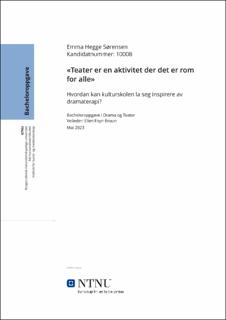«Teater er en aktivitet der det er rom for alle»
Bachelor thesis
Permanent lenke
https://hdl.handle.net/11250/3078458Utgivelsesdato
2023Metadata
Vis full innførselSamlinger
Sammendrag
Oppgaven med tittel «Teater er en aktivitet der det er rom for alle» har som problemstilling: Hva er dramaterapi, og hvordan kan kulturskolen la seg inspirere av dramaterapi?Målet er å undersøke og presentere hvordan kulturskolen kan ha nytte av dramaterapeutiske tilnærminger. Dette gjøres med en kvalitativ metode i form av dybdeintervju med en kulturskolelærer, samt relevant teori om dramaterapi og rammeplanen fra Kulturskolerådet. Teorien viser at dramaterapi bruker dramabaserte teknikker for å for eksempel endre adferd, helbrede eller oppnå personlig vekst. Analysen viser likhetstrekk mellom feltene, som relasjon mellom leder/deltager, lek og tilrettelegging. Ulikheten er hovedsakelig intensjonen bak teknikkene, da dramaterapi fokuserer mer på forandring og helbredelse. Resultatene besvarer problemstilling ved å sammenligne feltene og gi eksempler på mulige innganger for dramaterapi i kulturskolen som Breddeprogrammet, veiledning eller kurs. Den viser at kulturskolen kan ha nytte av kunnskapen og erfaringene dramaterapeuter har, spesielt med dagens økte fokus på tilrettelegging for ulike behov og fokus på psykisk helse. This thesis is entitled «Theatre is an activity where there is room for everyone», and the research question is: What is dramatherapy, and how can dramatherapy inspire Schools of Music and Performing Arts?The aim of the thesis is to investigate and present how Schools of Music and Performing Arts can benefit from drama therapeutic approaches. This was done using a qualitative method, where a teacher from Schools of Music and Performing Arts works, as well as relevant theory about dramatherapy and the curriculum. The theory shows that dramatherapy uses drama-based techniques to for example change behavior, heal or for personal growth. The analysis shows that the fields have several similarities, such as the importance of the relationship between leader and participant, play and facilitation. The difference is mainly the intention behind the techniques, as dramatherapy focuses more on change or healing. The results compare the fields and shows several entrances for Schools of Music and Performing Arts to be inspired by dramatherapy, for example by being incorporated into the school’s breadth-program, or by guidance or courses. It shows that they probably will benefit from the knowledge and experience drama therapists have, especially due to the increased focus on facilitation for different needs and the focus on mental health.
